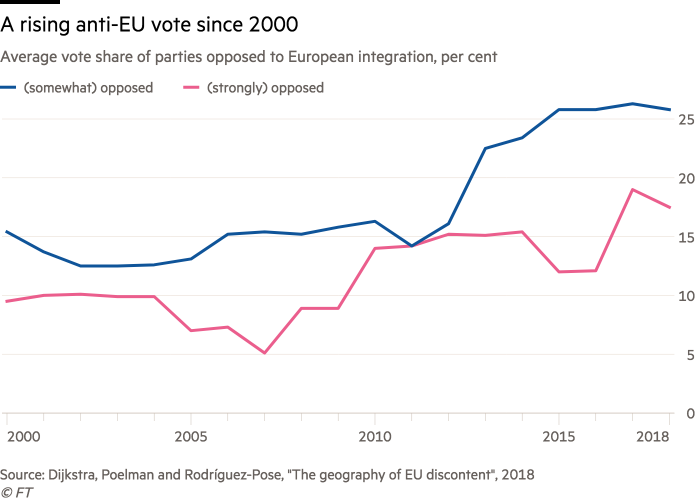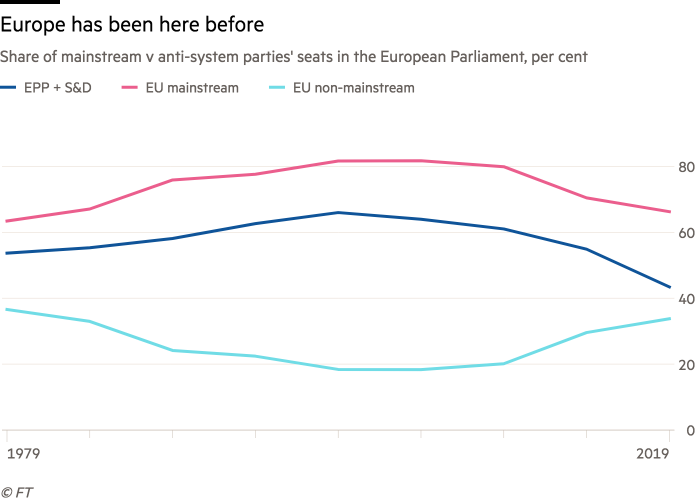Der EU ist es schon mal gelungen, Anti-EU-Kräfte einzudämmen
Martin Sandbu von der FT macht der EU Hoffnung. Es war schon mal schlimmer mit der Anti-EU-Stimmung. Es sollte also möglich sein, auch diesmal das Steuer herumzureißen. Das glaube ich übrigens auch, allerdings setzt dies einen Wandel voraus. Vor allem eine Lösung der Probleme der Eurozone. Doch nun erst mal zu der Argumentation von Sandbu:
- “As the European Parliament elections approach, the big theme is that anti-European forces — populist movements especially of the right but also of the left — are expected to make headway.” – bto: weil die EU ihre zentralen Versprechen nicht erfüllt: Wohlstand und sichere Außengrenzen. Full stop.
- “According to Europe Elects’ latest available projection based on national polls, anti-system parties (most of which are deeply critical of the EU if not against all international co-operation in itself) stand to win close to one-third of all the seats.” – bto: was aber auch damit zu tun hat, dass man auf EU-Ebene eher Protest wählen kann, da es ohnehin keine große Auswirkung hat. Siehe die beschränkte Einflussmöglichkeit des EU-Parlaments.
- “(…) Europe has been here before. Criticism of the EU has clearly been rising since the start of the millennium, as the graph below shows. That comes from a report on the ‚geography of EU discontent‘, which also shows how unevenly spread that discontent is, leaving no doubt that recent economic decline is a big factor in the anti-EU vote.” – bto: Das ist das Spiegelbild der ungelösten Eurokrise. Nicht mehr und nicht weniger.
Quelle: FT
- “The anti-European wave can be observed in most countries. (…) Support is overwhelmingly on the rise, although there are exceptions, notably in Belgium and the Netherlands. The chart below (from a presentation on regional policy by Lewis Dijkstra, a co-author of the report mentioned above) traces the country-by-country change in the vote for parties strongly opposed to EU integration from 2000 to 2018.” – bto: Man schaue sich Italien an! Das ist Depression an der Arbeit! Von fast null auf über 20 Prozent. Wer diese Dynamik nicht versteht, der versteht das Problem der EU nicht.
Quelle: FT
- “Is this a uniquely powerful challenge to the European project? Hardly. (…) Below is the trajectory of the European Parliament vote from the first elections in 1979 to today. What is clear is that the recent anti-European swell is, in some sense, only a return to the norm — or at least to levels the EU has previously managed to handle and indeed beat back. While the vote share for the two biggest parties — the centre-right EPP and the social democratic S&D — is heading for an all-time low, the overall ‚European mainstream‘ (which includes the liberals and the greens, both ardent pro-Europeans) is stronger than in 1979. The anti-system forces, conversely, are electorally no stronger (actually a little less) than 40 years ago.” – bto: Das ist allerdings nur vordergründig eine gute Nachricht. Denn die Brüsseler Bürokraten und die unkritischen EU-Betrachter werden daraus den Schluss ziehen, dass sie nichts zu ändern brauchen. Fundamental ist es aber ein Unterschied zu früher. Diesmal geht es um ein viel fundamentaleres Problem, nämlich die ungelösten Probleme des Euro, die heute noch verdeckt sind. Mit der nächsten Rezession werden die “Anti-EU-Kräfte” deutlich hinzugewinnen.
Quelle: FT
- “The longer view shows not only that Europe has seen this sort of swell before and lived to tell the tale, but that the circumstances were similar. The early 1980s saw the convulsions of deindustrialisation, and anti-system forces benefited much like now, when the aftermath of the financial crisis (and its dire mishandling by policymakers) has come on top of lingering hardship from the structural change decades earlier.” – bto: was bedeutet, es hängt an der wirtschaftlichen Entwicklung.
- “But it also shows that during the good economic times of the 1990s and the early 2000s, the anti-European wave ebbed and support for the European project returned. What has been achieved before can surely be achieved again — if we draw lessons not just from the mistakes of the past, but from the successes too.” – bto: Problem ist allerdings – und das weiß Sandbu auch –, dass wir den Keim der nächsten Krise schon gelegt haben, ohne die alte zu überwinden.










